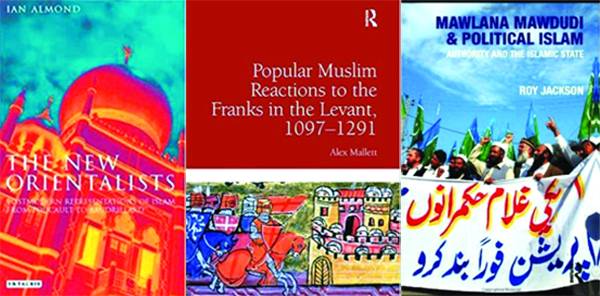
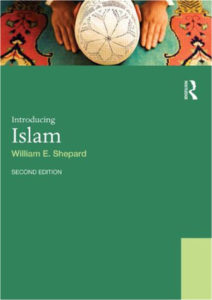
Introducing Islam
William E. Shepard
Routledge (2014)
Rs10,141
Just what is Islam and what does it mean to be a Muslim in the world today? Since the events of 9/11 and 7/7, Islam has become one of the most controversial and misunderstood religions in the world. Introducing Islam encourages students to put aside their preconceptions and explore this fascinating religion.
William Shepard traces the history of Islam from its origins in the life and career of the Holy Prophet Mohammad (PBUH), through its classical expressions, to its interactions with the West in the modern world. A chapter is devoted to each major topic, including The Holy Quran, Islamic law, Islamic theology, and the Sufi movement, as well as community rituals and Islamic art and culture. There is a survey of modern developments and four chapters are dedicated to individual countries, Turkey, Iran, Egypt and Indonesia.
Fully revised and updated, the second edition of this core textbook adds crucial material on contemporary issues such as women in Islam and democratization and human rights. Illustrated throughout, the book also includes learning objectives, a glossary of key Arabic terms, comprehensive further reading lists and critical thinking boxes, helping students to critically engage with the material in each chapter. Further teaching and learning resources are available on the companion website at www.routledge.com/cw/shepard. This book continues to be essential reading for students of Islam worldwide.
William E. Shepard is Associate Professor, Retired, of Religious Studies at the University of Canterbury, Christchurch, New Zealand. His previous publications include The Faith of a Modern Muslim Intellectual (Ahmad Amin)(1982), Sayyid Qutb and Islamic Activism (1996) and numerous articles and translations.
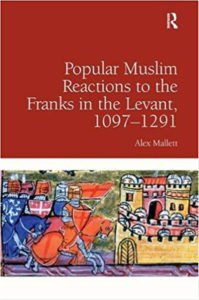
Popular Muslim Reactions to the Franks in the Levant, 1097–1291
Alex Mallett
Routledge (2014), Rs10,141
The issue of Muslim reactions to the Franks has been an important part of studies of both the Crusades and Islamic History, but rarely the main focus. This book examines the reactions of the Muslims of the Levant to the arrival and presence of the Franks in the crusading period, 1097-1291, focussing on those outside the politico-military and religious elites. It provides a thematic overview of the various ways in which these ‘non-elites’ of Muslim society, both inside and outside of the Latin states, reacted to the Franks, arguing that it was they, as much as the more famous Muslim rulers, who were initiators of resistance to the Franks. This study challenges existing views of the Muslim reaction to the crusaders as rather slow and demonstrates that jihad against the Franks started as soon as they arrived. It further demonstrates the difference between the concepts of jihad and of Counter-Crusade, and highlights two distinct phases in the jihad against the Franks: the ‘unofficial jihad’ - that which occurred before uniting of religious and political classes - and the ‘official jihad’ - which happened after and due to this unification, and which has formed the basis of modern discussions. Finally, the study also argues that the Muslim non-elites who encountered the Franks did not always resist them, but at various times either helped or were unresisting to them, thus focussing attention away from conflict and onto cooperation. In considering Muslim reactions to the Franks in the context of wider discourses, this study also highlights aspects of the nature of Islamic society in Egypt and Syria in the medieval period, particularly the non-elite section of society, which is often ignored. The main conclusions also shed light on discourses of collaboration and resistance which are currently focussed almost exclusively on the modern period or the medieval west.
Alex Mallett was Leverhulme Early Career Fellow in the History Department at Royal Holloway, University of London, UK in 2010-11.
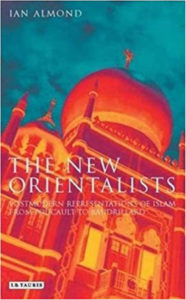
The New Orientalists: Postmodern Representations of Islam from Foucault to Baudrillard
Ian Almond
I.B.Tauris & Co Ltd. (2007), Rs8,503
The west’s Orientalism - its construction of an Arab or Islamic ‘Other’ - has been exposed and examined under the critical theory microscope and thoroughly expelled, it seems, from academic thought. At the same time postmodern thinkers from Nietzsche onwards have employed the motifs and symbols of the Islamic Orient within an ongoing critique of western modernity, an appropriation which, this hugely controversial book argues, runs every risk of becoming a new and more insidious Orientalist strain. Ian Almond sensitively yet rigorously examines the work of Nietzsche, Jacques Derrida, Michel Foucault, Jean Baudrillard, Julia Kristeva and Slavoj Zizek, as well as that of postmodern writers Jorge Luis Borges, and Orhan Pamuk. In doing so he exposes the implications of this ‘use’ of Islam for both the postmodern project and for Islam itself. Taking apart the assumptions, omissions and contradictions inherent in these thinkers’ approaches to Islam and to the Arab world, and drawing on the work of prominent Muslim thinkers including Ziauddin Sardar, Aziz Al-Azmeh and Bobby S. Sayyid, “The New Orientalists” highlights the difficulty of ever speaking truly about the ‘Other’.
In light of the current Western climate of fear and hysteria surrounding the Islamic world, this groundbreaking project could hardly be more timely.
Ian Almond teaches English and American Literature at the Europa-Universitat-Viadrina (Frankfurt Oder) and the Freie Universitat (Berlin). He is also the author of Sufism and Deconstruction (2004).
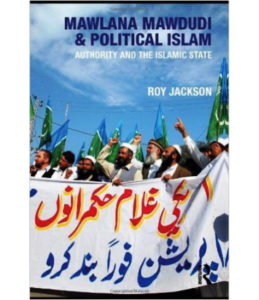
Mawlana Mawdudi and Political Islam: Authority and the Islamic State
Roy Jackson
Routledge 2011
Rs12,482
Mawlana Mawdudi was one of the most influential and important Islamic thinkers of the modern world, whose brand of political Islam has won widespread acceptance in South and South-East Asia as well as the Middle East. He was not only an Islamic scholar, but also a journalist and political activist who founded the Jama’at-i-Islami, which has subsequently influenced the development of many Islamic movements and parties throughout the Muslim world.
This book is the first to critically engage and assess his career and legacy within the wider context of political Islam. It includes coverage of his early life and influences, and examines his considerable influence in the contemporary Islamic world. The issues that were a concern for Mawdudi and continue to have resonance for our world today include such questions as the role of women in Islam, the possibilities for democracy in an Islamic state, the importance of jihad, and the moral and religious responsibility of the individual. Whilst focus is on Mawdudi’s life and writings, this is placed within the wider context of topical, often contentious, Islamic thought.
Providing an up-to-date and detailed critical study of Mawlana Mawdudi and many issues surrounding political Islam both in his time and today, this book will be an important text for scholars of Islamic Studies, Political Science and Philosophy.
Roy Jackson is Senior Lecturer in Religion, Philosophy and Ethics at the University of Gloucestershire with a research interest in the interaction between religion, ethics, and philosophy, with particular emphasis on Islam. He is the author of Fifty Key Figures in Islam (2006), and Nietzsche and Islam (2007), both published by Routledge.
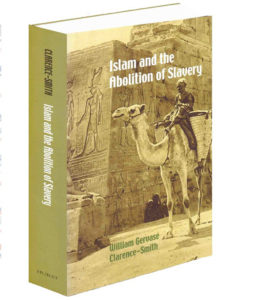
Islam and the Abolition of Slavery
W. G. Clarence-Smith
Oxford University Press (2006)
Rs3,633
Contemporary debates about Muslim slavery occur in a context of fierce polemics between Islam and other belief systems. While Islamic groups had an ambivalent and generally muted impact on the legal repudiation of slavery, a growing religious commitment to abolition was essential if legislation was to be enforced in the twentieth century. Drawing on examples from the whole ‘abode’ of Islam, from the Philipines to Senegal and from the Caucasus to South Africa, Gervase Clarence-Smith ranges across the history of Islam, paying particular attention to the period from the late 18th century to the present. He shows that “Sharia-minded” attempts to achieve closer adherence to the holy law restricted slavery, even if they did not end it. However, the Sharia itself was not as clear about the legality of servitude as is usually assumed, and progressive scholars within the schools of law might even have achieved full emancipation over the long term. The impact of mystical and millenarian Islam was contradictory, in some cases providing a supportive agenda of freedom, but in other cases causing great surges of enslavement. The revisionist Islam that emerged from the 18th century was divided. “Fundamentalists” stressed the literal truth of the founding texts of Islam, and thus found it difficult to abandon slavery completely. “Modernists, ‘ appealing to the spirit rather than to the letter of scripture, spawned the most radical opponents of slavery, notably Sir Sayyid Ahmad Khan, the Islamic William Wilberforce. Once slavery had disappeared, it was the Sufi mystics who did most to integrate former slaves socially and religiously, avoiding the deep social divisions that have plagued Western societies in the aftermath of abolition. In this important new book, Clarence-Smith provides the first general survey of the Islamic debate on slavery. Sweeping away entrenched myths, he hopes to stimulate more research on this neglected topic, thereby contributing to healing the religious rifts that threaten to tear our world apart in the 21st century.
William Gervase Clarence-Smith is Professor of History in the School of Oriental and African Studies at the University of London.

